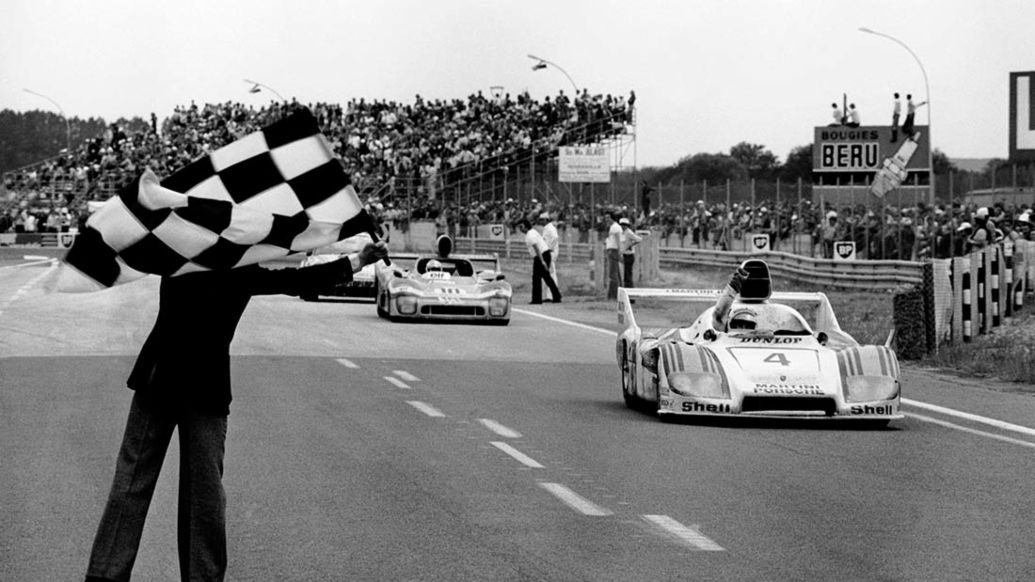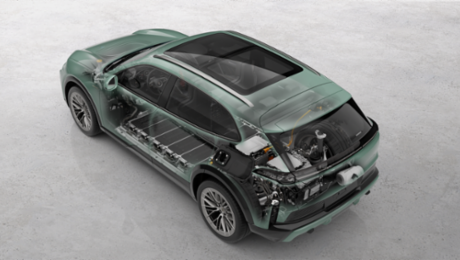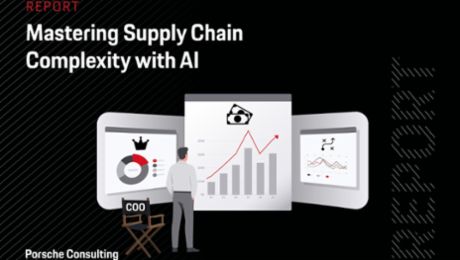Magic moments in Le Mans – Part 1
The record of 17 overall wins at what is probably the hardest car race in the world remains unbeaten. Memories of important races for Porsche.

Gijs van Lennep
(Born 16.03.1942 in Bloemendaal, NL, 1971 and 1976 overall winner with Porsche):
“My first overall victory was, of course, unforgettable. Helmut Marko and I were driving a Porsche 917 Kurzheck. We found out only later that it had a superlight magnesium tubular frame. They didn’t want to make us nervous. Le Mans is special and exhilarating. To win there is beyond comparison. But more than the victory, another image from 1971 has burned its way into my memory. Even now, I frequently see the image before me. It was night and I was driving down the Mulsanne straight at over 350 km/h. And then I saw a fire. Fuel was running over the track. A burning car from one of the smaller classes had – luckily for me – already come to a stop at the edge of the track, and fortunately at the moment I wasn’t battling it out with someone or lapping another car. I saw the yellow flags and drove past the accident at walking speed.”
Manfred Jantke
(Born 02.10.1938 in Oppeln, DE, Head of Porsche Sports and PR 1972-1991):
“The region of the Sarthe is generally characterised by a slow pace of life. And then once a year the fastest cars in the world come to visit. Speed rules the roost, bringing excitement, noise, and danger. The drivers experience a similar study in contrasts. As the race director, I often woke the drivers for their turns. Those were special moments, and there were big differences. The physically strongest driver was definitely Jochen Mass. He was really never tired and hardly needed any sleep. Jacky Ickx was always immediately present when you woke him. But some could barely handle the demands and had to be shaken out of a deep sleep of exhaustion. They’d only just come to before having to get behind the wheel. And in those days, the cars were incredibly loud. It must have felt like going from the bosom of Abraham into some hellish machine.”
Jürgen Barth
(Born 10.12.1947 in Thum, DE, overall winner with Porsche 1977):
“It was one of my jobs to look after customer teams, and I was responsible for organisational things like accommodations, food, tickets, and stuff like that. At the same time, I was also a reserve driver, and I always hoped for a chance to drive, like in 1982: Hurley Haywood, who was sharing a 956 with Al Holbert, had to pull out with stomach problems. His stomach was his Achilles’ heel. I was notified at around 11 p.m., and hopped right into my racing suit. My colleagues joked that I’d put something in Hurley’s food so that I could drive. It was nonsense, of course. In the car, my enthusiasm dimmed somewhat because I couldn’t help noticing that Hurley and Al both had narrower hips than I did. My hips only fit in the seat sideways; I was constantly shifting from one side to the other. We came in third. At the start, I had no idea that I would take part. Sunday, I was on the podium.”
Rudi Lins
(Born 28.06.1944 in Bludenz, AT, racing for Porsche 1964 to 1971):
“I drove three times at Le Mans, but 1970 is the year that has stuck in my memory the most. Together with Helmut Marko, we won the prototype and index classes and came in third overall in the Porsche 908. That night it rained cats and dogs. Rain, rain, rain for hours. No one who hasn’t experienced that can imagine what that means for a driver at Le Mans. If you want to overtake a car, first you have to dive into the spray. You can’t see a thing, you have no idea what’s behind the spray: One car? Two? For a while Hans Herrmann and I were driving together at night. That was good, because we knew who we had around us. For Helmut Marko and me, there was also the fact that our car was an open one. At the end of a turn we were soaking wet – if not from sweat, than from the rain. I was just 25, a young’un.“
Hans-Joachim Stuck
(Born 01.01.1951 in Garmisch-Partenkirchen, DE, overall winner with Porsche 1986 and 1987):
“My Le Mans moment lasted three minutes and 14.8 seconds. Pole position with the Porsche 962 C, a perfect lap. And because the Mulsanne straight was later defanged through the addition of chicanes, it will likely be a record for posterity. The 962 is the best race car that I ever drove. Brute force and unbelievable ground effects. The centrifugal forces were enormous, and there was no power steering. You needed the strength of a bear and a lot of courage. I just had one run because of the tyres. Start, Dunlop curve, left, right through the Esses. At Tertre Rouge I was pushing the traction limits. But the corner is so important for your speed on the Mulsanne straight, and it was right on. Fifty seconds of flooring it, then brake from 360 km/h for the Mulsanne corner and jump back on the gas as soon as possible. Indianapolis, Arnage, Porsche curves, Maison Blanche, Ford chicane, and you’re done. In those three minutes my concentration was sharp as a knife. It was just me and that Porsche at Le Mans.”

